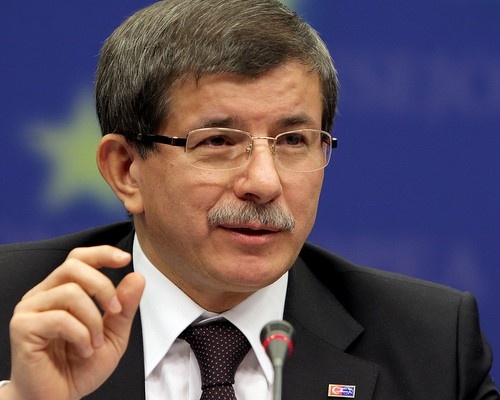The Turkish FM Davutoglu warned that the Assad regime must not be allowed to kill civilians with other weapons after the destruction of its chemical weapons.
 Amid ongoing diplomatic traffic at the United Nations Security Council (UNSC) towards a resolution on Syria, Turkish Foreign Minister Davutoglu blamed the Syrian regime for being the source of radicalism, intolerance and sectarianism while referring to the recent radical movements in the country. Davutoglu attended a meeting of the Friends of the Syrian People on the occasion of the UN General Assembly on Thursday. Reminding that the Assad regime had committed a crime against humanity with the August 21 chemical weapons attack near Syrian capital Damascus, which killed more than 1,000 poeple, Davutoglu said Turkey welcomed the agreement on the destruction of the Syrian regime’s chemical weapons. “This agreement does not mean the end of the Syrian conflict,” he said. “The Assad regime must not be allowed to kill civilians with other weapons, and those who committed a crime against humanity must be punished.” He also said the number of the Syrian refugees in Turkey had reached 600 thousand, warning the figures may reach 1 million unless the war ends in Syria, according to the UN. Davutoglu urged the international community to provide secure settlements for the refugees and to open humanitarian corriodors to easily send humanitairan aid to them.
Amid ongoing diplomatic traffic at the United Nations Security Council (UNSC) towards a resolution on Syria, Turkish Foreign Minister Davutoglu blamed the Syrian regime for being the source of radicalism, intolerance and sectarianism while referring to the recent radical movements in the country. Davutoglu attended a meeting of the Friends of the Syrian People on the occasion of the UN General Assembly on Thursday. Reminding that the Assad regime had committed a crime against humanity with the August 21 chemical weapons attack near Syrian capital Damascus, which killed more than 1,000 poeple, Davutoglu said Turkey welcomed the agreement on the destruction of the Syrian regime’s chemical weapons. “This agreement does not mean the end of the Syrian conflict,” he said. “The Assad regime must not be allowed to kill civilians with other weapons, and those who committed a crime against humanity must be punished.” He also said the number of the Syrian refugees in Turkey had reached 600 thousand, warning the figures may reach 1 million unless the war ends in Syria, according to the UN. Davutoglu urged the international community to provide secure settlements for the refugees and to open humanitarian corriodors to easily send humanitairan aid to them.
He expressed support for an early convening of the second international conference on Syria in Geneva, saying the conference would produce positive results only if the Assad regime were removed.
Meanwhile French Foreign Minister Laurent Fabius said the five permanent members of the UN Security Council – Russia, the US, UK, France and China –agreed on a resolution to destruct Syria’s chemical arsenal in line with a US-Russian deal reached earlier this month.
Fabius also said they accelerated work to find a permanent solution to the crisis in Syria.
Ahmad al Jarba, the head the Syrian National Coaliton, said they would attend the second conference on Syria in Geneva “if a transitional government is formed with those who do not have blodshed in their hands, political prisoners are released, the siege is lifted in Syiran cities and attacks targeting civilians are terminated.”
Turkish FM discusses regional issues with counterparts
Davutoglu on Thursday discussed Sudanese-South Sudanese relations, crises in Egypt and Syria, and roles of Turkey and Brazil in global affairs with his counterparts in New York.
Davutoglu met his Sudanese, South African and Brazilian counterparts along with a former UN General Assembly Chairman within the scope of bilateral meetings in the opening week of the 68th UN General Assembly.
A statement released by the Turkish Ministry of Foreign Affairs reported that FM Davutoglu met former President of UN General Assembly Vuk Jeremic on Thursday and discussed various issues within the context of the UN agenda and certain regional issues.
He also discussed Sudan and South Sudan relations with Sudanese FM Ali Karti. Davutoglu reportedly informed his counterpart that Turkish Airlines would soon start “peace flights” to Sudan which fly to Khartoum and Juba in a single flight.
Furthermore, Karti informed Davutoglu about the recent protests against economic measures in Sudan, saying they attribute great importance to Turkey’s efforts and Turkish investors’ activities in Sudan to improve the Sudanese economy.
Davutoglu also met his South African counterpart Maite Nkoana-Mashabane and reportedly discussed the reform of global governance and the reform of the UN Security Council’s structure. Both foreign ministers agreed that Turkey and South Africa, as two regional and influential powers in global affairs, shared similar ideas concerning many global issues and should move in cooperation on global or regional issues.
Stating that he appreciated Turkey’s efforts in Somalia and could understand why the al-Shabab terrorist group targeted Turkish interests in the country, the South African foreign minister said he would like to visit Turkey as soon as possible.
Davutoglu also held a meeting with Brazilian Foreign Minister Luiz Alberto Figueiredo. The two leaders discussed the Iranian nuclear program and the efforts of Turkey and Brazil in the negotiations in 2010, which reflected the two states’ constructive role in global affairs and the badly missed opportunity, alongside the developments in Egypt and Syria.
Davutoglu congratulated his Brazilian counterpart for acquiring the position after former Brazilian Foreign Minister Antonia Patriota resigned from his position. Patriota left the post following a diplomatic crisis with Bolivia in August over the transfer to Brasilia of Bolivian Senator Roger Pinto, who took refuge in the Brazilian embassy of La Paz for 15 months after being sentenced by his country to one year in prison for corruption, without the approval of Bolivia President Evo Morales. Luiz Alberto Figueiredo was afterwards appointed as foreign minister.
Türkiye Newspaper















